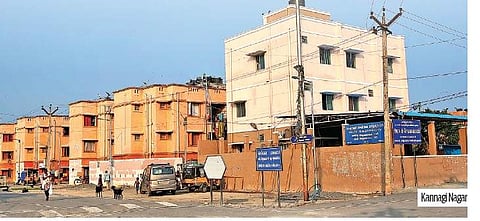

CHENNAI : Almost four months after they organised a public hearing on forced evictions and resettlement woes, the Unorganised Workers Foundation (UWF) along with other non-governmental organisations released a report on Monday, giving a tragic account of the lives of those resettled to the outskirts and insights into the possible solutions that experts believe can mitigate the impact.A report said several years after resettlement, Kannagi Nagar continues to remain a home only for the weekends to some. “There are many who come back to Kannagi Nagar only on Sundays because they work at their old places and could not travel long distances daily. Some of us reside on the pavements on weekdays and return to Kannagi Nagar on weekends,” the report quoted Manimegalai, a resident of Kannagi Nagar resettled from Sathya Nagar near Chennai harbour, as saying.
People from 63 areas in the city have been resettled in Kannagi Nagar, which has 15,656 houses, and in nearby Ezhil Nagar that has 8,048 houses.Ironically, experts said several people who were resettled citing flood-proneness where actually sent to new areas that were highly prone to floods. Quoting Sagayam from Semmenchery, the report stated, “When Cyclone Vardah hit Chennai, Semmenchery was flooded. My wife slipped and fell in the toilet that was flooded with drainage water.”
Twenty minutes later, she was found floating and was later pronounced as brought dead at hospital due to toxic gas inhalation. However, Sagayam and his family are yet to receive the compensation of `2 lakh promised to them, the report said.The report was rife with tales of unemployment, poverty and lack of access to emergency services in the mass resettlement townships. Parameswari, who lived along Konnur High Road, said their houses were razed down at 7 am and that they got time only to collect a few belongings. “We were informed that our resettlement houses were ready. Tenements constructed as tsunami relief were allocated to us. No facilities were available there. So my family came back to our original area, and now live on the streets,” the report quoted her as saying.
However, UWF adviser Geetha said finding an alternative location was not difficult. “There is a goshala with 2,500 cows right opposite the KH Road. It is located on gvernment land and more than 3,000 houses could be built there,” the report quoted her as saying.=The report was released by retired Justice D Hari Paranthaman, Madras High Court, and brought out in association with the Penn Urimai Iyakkam, League for Social Justice, Annai Illam, Coastal Community Protection Movement (CCPM), Information and Resource Centre for the Deprived Urban Communities (IRCDUC), and National Alliance of People’s Movement (NAPM).
Recommendations
Forced resettlement of working class families to distant sites should be immediately halted and options for in-situ upgrading or redevelopment of slum settlements adopted in line with national and state-level policies
Urgently and actively pursue measures to identify and acquire land for housing working class urban dwellers within the city
Where relocation is unavoidable, ghettoisation of working class should be avoided
In the existing resettlement colonies, government should focus on mitigating the negative effects that have already been produced, by immediately remedying the sub-standard quality of services and amenities
Government should work forward to ensure adequate legal/policy safeguards for the deprived urban communities
State to adopt participatory policy making processes
State should
recognise people’s ‘Right to the City’
The people of Konnur High Road slum, a declared slum area, and many other slums who got evicted should be provided with alternative accommodation in nearby areas
The people of Nalla Thanneer Odai Kuppam should be given vacant quarters of Chennai Port or those located in nearby closed factory land as given for 1,000 families
post-tsunami, as per the NCW public hearing recommendations